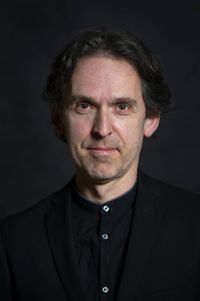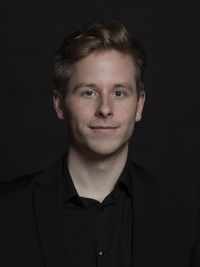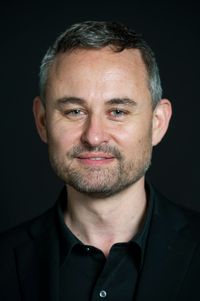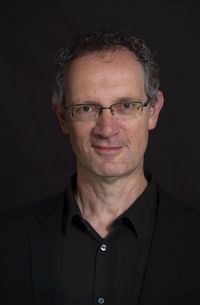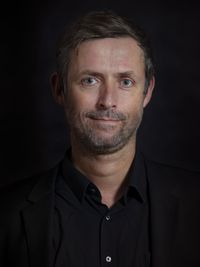BASSUS
During his musicological studies at the University of Tours, Marc Busnel tackled the repertoire of the Renaissance with the ensemble Jacques Moderne under the direction of Jean-Pierre Ouvrard. At the same time, his musical training and writing studies at the Conservatory of Tours and classical singing lessons with Pali Marinov enabled him to access many musical styles, up to contemporary artistic creations. After his professional debuts with the ensemble Clément Janequin, he currently performs with the ensembles Musica Nova, Huelgas, Doulce mémoire, Ensemble Solistes XXI (Les Jeunes Solistes), Les musiciens de Saint-Julien, La Main harmonique, Cappella Pratensis, Correspondances, La Sestina, etc. on numerous concerts and recordings, including as soloist. Marc Busnel has worked under the direction of Jean-Pierre Ouvrard, Paul van Nevel, and Dominique Visse for medieval and Renaissance repertories; Hervé Niquet, Martin Gester, Sébastien Daucé Baroque music; Bernard Têtu for the Classical and Romantic periods; and Marie-Claude Vallin, Roland Hayrabedian, Leo Warinsky, Bruno Mantovani, Peter Eotvös, and Sylvain Cambreling for contemporary music. His specialization in the music of the Renaissance led him to teaching reading from facsimiles at the CRR in Tours as well as to a collaboration with the Centre d’Études Supérieures de la Renaissance in Tours on the projects Corpus des Messes Anonymes du XV siècle and Atelier Virtuel de Restitution Polyphonique of the musicological research program Ricercar.
Máté Bruckner ( photo Sander Heezen)
Máté started singing as a boy treble in the choir of the Saint Ignatius of Loyola Benedictine Church in Győr, Hungary. The choir – Collegium Musicum Jaurinense – was led by professional musicians such as Áron Kelemen (Liszt Academy, Sacred Music) and Gábor Soós (Conservatorium van Amsterdam, Organ), whose dedication and commitment inspired Máté to pursue a musical career.
In 2016, he went to The Hague, The Netherlands, to study Early Music Singing under Rita Dams, Pascal Bertin, Peter Kooij and Robin Blaze. He has worked with internationally renowned musicians such as flutist Kate Clark, gambist Mieneke van der Velden, recorder player Daniel Brüggen and lutenist Mike Fentross within the framework of school projects. He has also been involved in international projects connecting European conservatoires, such as the VoxEarlyMus intensive programme in Parma and Urbino, Italy and the AEC Early Music Platform and Vox Multiplier Event in Bucharest, Romania. The performances of these were coached and conducted by Isaac Alonso de Molina, keyboard player, music theorist and teacher at the Royal Conservatoire of The Hague. Over the past years Máté’s field of interest has strongly been trending towards medieval and renaissance music. He is a member of the ensemble Cantores Sancti Gregorii (Jan Janovcik), a group often present at traditional services in The Netherlands and also becoming more and more engaged in educational activities on a yearly basis in Spain and Hungary. Máté has appeared regularly with Cappella Pratensis, past and upcoming performances with them include several venues in The Netherlands and Belgium, as well as in Italy, France and Finland. Both groups perform from original notation and are eager to experiment with different improvisational and compositional techniques. Máté still maintains a connection with his old choir in Hungary as well as its ’brother choir’ in Augsburg – the Augsburger Domsingknaben. Recent years highlight a joint project with both choirs in Hungary, with music by 18th-century Hungarian composer Benedek Istvánffy, Bach’s St John Passion with the Domsingknaben in Germany and several other productions in Hungary as part of the Collegium Musicum’s concert series.
As an academic he is a postdoctoral researcher at the University of Oxford, where he works on music in the late mediaeval Habsburg courts (www.malmecc.eu). He also directs a major project on the chapel of Maximilian I Habsburg at the University of Vienna. His research focusses on learned culture in the Renaissance, especially the links between musical thought, theology, philosophy and medicine.
Donald Bentvelsen (photo Sander Heezen)
Donald Bentvelsen started his musical life as a guitarist. Classical, Folk music, and even Rock were styles he played and sung. While studying English Language and Literature at the University of Leiden, where he also took the minor subjects Italian and Musicology, his interest in singing was sparked in a new way by joining the Leiden English Choir. After participating in an edition of the Nederlands Studenten Kamerkoor, he started taking singing lessons. He sang at the Sweelinck Conservatory and had the privilege to study Classical Vocals with Margreet Honig. During this study he joined the newly founded Amsterdam Baroque Choir of Ton Koopman, of which he is a member to this day, and founded the Egidius Quartet. These were formative years in which he got to know the styles of Baroque and polyphony. The passion for early music was born. With the Egidius Quartet, a beautiful discography was recorded and released at Et’Cetera, culminating in the recording of the Leiden Choirbooks. Now he considers it a great privilege to be able to participate in recordings of repertoire from the Den Bosch Choirbooks. In addition to singing polyphony, Donald Bentvelsen enjoys working with various ensembles, such as the Nederlands Kamerkoor, Ad Mosam, Cappella Amsterdam, Choeur de Chambre de Namur, and De Nederlandse Bachvereniging. He also regularly provides coaching to choirs and likes to compose vocal music.
Donald Bentvelsen has lived in Wallonia since 2011 and his passions outside of music include photography, cycling, hiking and cooking.
In his professional career Bram has a special interest in and love for ensemble repertoire, especially that of the 14th, 15th and 16th centuries. Apart from Cappella Pratensis, he is a member of the Hemony Ensemble, Seconda Pratica and regularly works for the Apollo Ensemble. As a soloist, in recent years he performed amongst others the soli in the Matthew and John Passion by Bach, numerous Bach Cantatas, the Mozart Requiem, but also the Vigilia by Rautavaara. Finally, as a choir singer Bram has in the past few years been working for the Netherlands Chamber Choir, the Netherlands Bach Association, the Helsinki Chamber Choir, as well as for the other professional choirs in the Netherlands. He is at present being coached by pedagogue dr. Geert Berghs.
